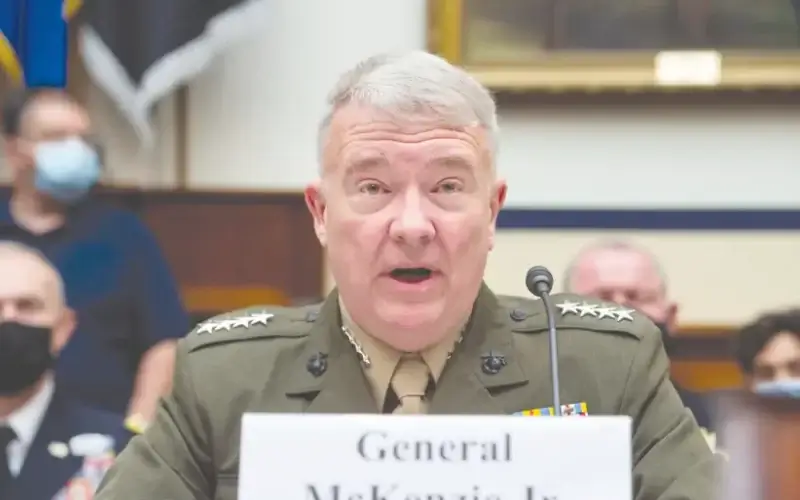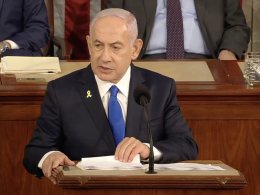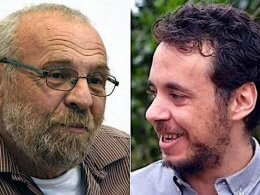IDF Chief of Staff Lt.-Gen. Aviv Kohavi met with senior Arab military leaders, including Saudi Arabia’s Chief of Staff Gen. Fayyadh bin Hamed Al Ruwaili, in Sharm el-Sheikh in March to discuss countering regional threats posed by Iran.
According to a report by The Wall Street Journal, the meeting was conducted under the auspices of the United States represented by then-head of Central Command Gen. Frank McKenzie, and brought together the top military commanders from Israel, Saudi Arabia, Qatar, Egypt and Jordan.
The United Arab Emirates and Bahrain also sent officers to the meeting, but not their military chiefs, the report said. Kuwait and Oman didn’t participate.
Quoting sources familiar with the talks, WSJ said that officials “reached an agreement in principle on procedures for rapid notifications when aerial threats are detected.”
As rocket and drone attacks by Iran have increased, talks have been taking place between Israel and several Gulf states to understand what is most relevant to counter the threats.
McKenzie was quoted in the report as saying during a press conference in March that “the task in the theater is really how do you knit those together so you create more than the simple sum of the component parts: so everybody sees the same thing, everybody gets an early warning, and everybody can be prepared to react very quickly to a potential Iranian attack.”
Earlier in the week, senior IDF officials held a three-day long strategic-operational meeting with a delegation of senior officials from CENTCOM. The meetings centered on a “joint tabletop exercise, during which a dialogue was held regarding shared regional security challenges and joint preparations for scenarios of regional escalation,” the IDF Spokesperson Unit said in a statement.
The meeting between the officials took place as Israel cements its role in CENTCOM after being moved last January from the responsibility of EUCOM (European Command) and also discussed opportunities for expanding operational cooperation.
The move to CENTCOM is believed to not only simplify cooperation with American troops in the region but can also create the potential for a regional coalition with Arab countries that have normalized ties with Israel against shared threats posed by Iran.
The increased cooperation with CENTCOM and the Gulf States is expected to give Jerusalem a leg up in terms of dealing with the threat posed by Tehran.
Israel has a number of advanced air defense systems used to counter threats from enemy states as do Gulf countries. Washington has hoped to build an integrated Middle East air defense system that would link the radars, satellites and other sensors belonging to regional militaries for decades.
The report by the WSJ comes a week after Defense Minister Benny Gantz said that Israel is building a US-sponsored “Middle East Air Defense Alliance” that has already thwarted threats and “that will strengthen the cooperation between Israel and countries in the region.”
“This program is already operative and has already enabled the successful interception of Iranian attempts to attack Israel and other countries,” he told the Knesset’s Foreign Affairs Defense Committee, led by MK Ram Ben Barak.
During a virtual seminar hosted by the Middle East Institute in February, McKenzie touted the idea of an integrated air and missile defense system as a “rare opportunity” now that Israel has joined CENTCOM.
“The unique capabilities that Israel brings, now that Israel is in the Central Command area of responsibility, is another great resource that we can draw upon as we build this,” he was quoted by Airforce Magazine as having said.
McKenzie said that while Iran “has relentlessly” built its ballistic missile stockpile, fleet of drones and land-attack cruise missiles, which have increased in the past five to seven years, it created the opportunity to bring Gulf countries together to counter the threats.
Kurilla was also quoted by Defense News as telling the Senate Armed Services Committee in February that an integrated missile and air defense is “probably the area with some of the greatest opportunity.”
“We are collectively stronger together, and there are areas where each one brings unique capabilities,” he said.










